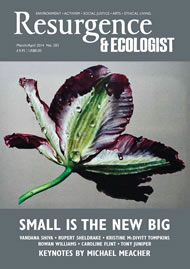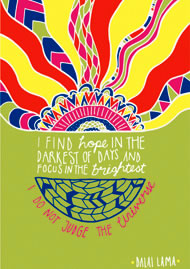By any standards, the Dalai Lama’s life has been extraordinary. The early challenges were unusual enough – as a toddler, Tenzin Gyatso was identified as the reincarnation of Chenrezig, the Buddha of Compassion. He relocated from his birthplace in eastern Tibet to the capital, Lhasa, was enthroned on 24 February 1940 as the 14th Dalai Lama, and embarked on years of intense study in Buddhist religion and philosophy.
As religious and temporal leader of the world’s last theocratic state, his position amongst world leaders was already unique, but he was thrust centre stage in 1949 when China’s People’s Liberation Army invaded Tibet. Aged just 14, he was forced to lead his people into the darkest chapter in their long history. After 10 years of attempting to reach an accommodation with China, it became clear that promises of religious tolerance and mutual respect were no more than hollow words; a national uprising was put down with extraordinary brutality, and as a result His Holiness fled to India, where he has lived in exile ever since.
For more than five decades, the Dalai Lama has inspired the Tibetan people, maintained their unique religious and cultural traditions, and kept their sense of identity alive. Although China has changed beyond recognition in the last half-century, moving from Chairman Mao’s peasant society on bicycles to the world’s second-largest economy, where more Bentleys were sold in 2011 than in the UK, one Chinese policy – so far at least – has remained constant: repression in Tibet.
Despite this, one other thing has also remained constant: His Holiness’s commitment to nonviolence and the resolution of the Tibetan issue through dialogue. Although his stand has won him plaudits in the West (including a Nobel Peace Prize and Templeton Prize), it has – so far – had no impact on Beijing and, given that failure, has infuriated many younger people in the exile community who feel that talk is a waste of time and that more extreme measures should be adopted – including violence. After all, they argue, Tibetans have nothing left to lose.
The Tibetan government in exile appeared to concur with this conclusion when they suspended bilateral talks in 2010 after they decided that the Chinese delegates had no genuine interest in reaching any agreement. Further participation would have merely prolonged the smokescreen that “ongoing talks” provide for Beijing when questions about human rights and freedom of religion in Tibet are being asked by Western countries.
This sense of desperation has been underlined by the wave of self-immolations that have swept the Tibetan Plateau in the last two years, the largest manifestation of discontent since significant uprisings in 2008. After decades of suffering, the lack of any clear way forward has left people without hope. Even mothers with young children have chosen to give their lives as a sacrifice that might, in some way, lead to a genuine change of heart in Beijing.
In this context, how does the Dalai Lama keep going? The answer lies in his faith. Not just his own religious faith, but also his faith in young people.
The Dalai Lama often declares his wish to end his days as a “simple Buddhist monk”, and that desire came one step closer in 2011 when – following an election amongst the exile community – he handed political power to a Harvard-educated Tibetan, Lobsang Sangay, enabling him to focus on his spiritual role alone. He remarked at the time: “I have become jobless as well as homeless.”
The Dalai Lama believes in nonviolence with every part of his being. In his own lifetime, he has seen the British Empire come to an end in India as a result of Gandhi’s campaign of civil disobedience, he has seen the Berlin Wall come down and the Baltic states liberated from Soviet Russia, he has seen apartheid come to an end in South Africa, and he has seen tyranny brought to an end through the Arab Spring. He has evidence that nonviolence can work, and the failed uprisings of 1959 and 2008 illustrate all too clearly what happens when a people of 6 million attempt to win their freedom from the world’s most populous nation by force.
Countering a feeling of hopelessness, His Holiness says: “If you think you are too small to make a difference, try sleeping with a mosquito in the room!”
Contrary to Beijing’s attempt to caricature the Dalai Lama as an enemy of the people or a devil in monk’s robes, the Dalai Lama is not “anti-Chinese”. He is simply anti a set of policies that he sees as misguided and bound to fail, and he is frustrated with Beijing’s inability to learn lessons from history. It must be clear by now that torture and repression don’t work, so why not try something else?
You need to build confidence and trust through truth, honesty, kindness and concern for the welfare of others. After all, as he was recently quoted, “Even an animal, if you show affection, gradually develops trust. If you always show a bad face and beating, how can you develop a friendship?”
Although the welfare of the Tibetan people will always be paramount in his concerns, in recent years His Holiness’ attention has moved beyond purely Tibetan questions and even beyond Buddhism – a truly remarkable position for a religious leader. The underlying reason for this is his understanding of the oneness of the human family. Instead of accentuating differences between people, he emphasises our common humanity. He doesn’t focus on race, religion, profession or status. He emphasises that we are all brothers and sisters – in the 21st century, this reality has become more and more obvious as the world becomes ever more connected through the Internet and all the forms of modern mass communication.
Like everything else, technology in and of itself is neutral – it can have positive or negative impacts, depending how we use it. It can be isolating if it enables people to lead ‘virtual’ lives in touch with people on the other side of the world but cut off from real contact with their next-door neighbours. On the other hand, seeing the problems in the Philippines or Syria playing out in our living rooms can empower a sense of togetherness in one human family, and trigger compassion. What really matters is the action that we take. His Holiness is passionate about the need to act – TODAY. He says: “There are only two days in the year that nothing can be done. One is called Yesterday and the other is called Tomorrow.”
At a meeting last year with Cambridge undergraduates, in the Q&A following his talk a member of the audience asked His Holiness for careers advice. To the surprise of many, His Holiness said that it didn’t really matter what path you choose in life, provided that it is your own path and not someone else’s; and provided the underlying motivation of any career was service to others.
The hope that His Holiness derives from meeting young people is best illustrated by his remarks to a group of students in Germany:
“Young friends, brothers and sisters, I am extremely happy to be here. On my way in just now, some of you gave me chocolate to satisfy my tongue, music to satisfy my ear; then the sight of your beautiful faces filled with smiles and excited good spirits were a joy to the eye. Whenever I meet young people like you, seeing your freshness I forget my own age.”








